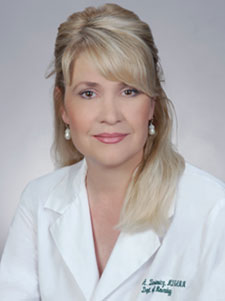USF neurologist lead author on updated AAN guideline for treating essential tremor
ST. PAUL, Minn. – The American Academy of Neurology has released an updated guideline on how to best treat essential tremor, which is the most common type of tremor disorder and is often confused with other movement disorders such as Parkinson’s disease. The guideline is published in the October 19, 2011, online issue of Neurology®, the medical journal of the American Academy of Neurology.
Essential tremor affects the hands, head and voice and can be disabling for the estimated 10 million people in the United States living with the disorder. Essential tremor usually starts after age 40, although symptoms can appear at any age and may cause problems with daily activities such as eating, writing, sewing or shaving.

USF Health’s Dr. Theresa Zesiewicz, lead author
According to the guideline, the high blood pressure drug propranolol and the drug primidone, used to treat seizures, are the most effective at improving shaking in people with essential tremor. The guideline also found the seizure drugs gabapentin and topiramate, along with the high blood pressure drugs atenolol and sotalol and the anxiety drug alprazolam, can be helpful.
“More and better research is needed since not all people with essential tremor benefit from these drugs,” said lead guideline author Theresa A. Zesiewicz, MD, professor of neurology at the University of South Florida in Tampa and a fellow of the American Academy of Neurology. “For people who are not benefitting from these drugs, it’s important they work with their neurologist to explore other types of treatments.”
William Foster, 76, diagnosed by Dr. Zesiewicz with essential tremor 10 years ago, says he initially thought the hand tremors that made it difficult for him drink a cup of coffee or play cards were brought on by nerves. He was prescribed topiramate and the twice a day dosage, which has increased over the years, still helps control his tremors without side effects.
“The drug has worked well for me,” Foster said. “I’m one of the lucky ones.”
Approximately 30 to 50 percent of people with essential tremor do not respond to medications, and for those who do, medication effectiveness tends to wane over time, Dr. Zesiewicz said. But, if that occurs, she informs patients about other treatment options.
The guideline found two types of brain surgery, deep brain stimulation and thalamotomy, may be helpful in treating essential tremor for those patients who do not benefit from drug treatment.
In addition, there was weak evidence to show the high blood pressure drugs nadolol and nimodipine, as well as the seizure drug clonazepam and botulinum toxin A, may be helpful in treating people with essential tremor.
This updated guideline differs from the Academy’s 2005 guideline in that it does not recommend using the seizure drugs levetiracetam and flunarizine or the drug 3,4-diaminopyridine (used in rare muscle diseases) to treat tremors of the arms and legs. In addition, the updated guideline found insufficient evidence to support using clozapine, a drug used to treat schizophrenia, to help people with essential tremor.
The guideline is endorsed by the International Essential Tremor Foundation.
USF Health neuroepidemiologiost Kelly Sullivan, MSPH, is a co-author of the updated AAN guideline.
About USF Health
USF Health is dedicated to creating a model of health care based on understanding the full spectrum of health. It includes the University of South Florida’s colleges of Medicine, Nursing, Public Health and Pharmacy, the School of Biomedical Sciences and the School of Physical Therapy and Rehabilitation Sciences; and the USF Physician’s Group. Ranked 34th in federal research expenditures for public universities by the National Science Foundation, the University of South Florida is a high impact global research university.
About the American Academy of Neurology
The American Academy of Neurology, an association of more than 24,000 neurologists and neuroscience professionals, is dedicated to promoting the highest quality patient-centered neurologic care. A neurologist is a doctor with specialized training in diagnosing, treating and managing disorders of the brain and nervous system such as Alzheimer’s disease, stroke, migraine, multiple sclerosis, brain injury, Parkinson’s disease and epilepsy. For more information about the American Academy of Neurology, visit http://www.aan.com.
Media contacts:
Anne DeLotto Baier, USF Health Communications, abaier@health.usf.edu or (813) 974-3303
Angela Babb, APR, ababb@ann.com or (651) 695-2789

